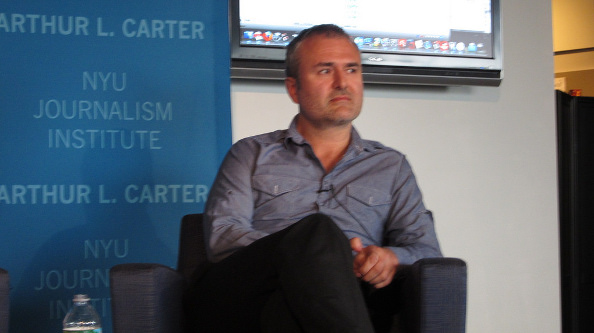At first glance, the idea that a shadowy third party’s out to destroy Gawker Media by funding lawsuits against the company (including Hulk Hogan’s) seems like quite the conspiracy theory. Even Gawker Media founder Nick Denton thought so at first when it was first suggested years ago, but now, he’s starting to believe differently. As Andrew Ross Sorkin writes in The New York Times, there are certain elements of these lawsuits that raise big questions about what their real motivation is and where the money is coming from:
During the trial, a low hum of speculation emerged within the legal community that Mr. Hogan’s legal case, which dragged on for more than three years, might be funded by someone other than Mr. Hogan — and for reasons other than simply inflicting financial pain on Gawker. At the time, the questions were provoked by several strategic decisions on Mr. Hogan’s side that didn’t appear economically rational. More on that in a moment. Back then, Mr. Denton dismissed the idea of a third party secretly underwriting Mr. Hogan’s case as “rather conspiracy-theorylike.”
But in recent weeks, in the face of several new lawsuits brought against Gawker that are unrelated to Mr. Hogan’s case and seem to personally attack certain Gawker writers, Mr. Denton is having second thoughts. All of the new cases, like Mr. Hogan’s, were brought by Charles J. Harder, a Los Angeles-based litigator, working on a contingency basis, who has most likely run up huge legal bills and expenses. Gawker has said it has already spent as much as $10 million on its side of the case.
Mr. Denton has begun to question whether Mr. Harder has a benefactor, perhaps one of the many subjects of Gawker’s skewering coverage.
“My own personal hunch is that it’s linked to Silicon Valley, but that’s nothing really more than a hunch,” Mr. Denton told me. “If you’re a billionaire and you don’t like the coverage of you, and you don’t particularly want to embroil yourself any further in a public scandal, it’s a pretty smart, rational thing to fund other legal cases.”
Mr. Denton’s view is based on the huge expenses of legal cases and settlements, the fact that Mr. Hogan’s financial health has been erratic — and on the rich history of lawsuits in which lawyers make money only if they win the case. There is an entire industry that exists to provide lines of credit to lawyers working on contingency. There is also a small netherworld of investors who back certain lawsuits.
“The answer may be entirely innocent,” Mr. Denton said, musing on the question of whether Mr. Harder was paid by someone other than Mr. Hogan, “but I think in order for people to understand what’s going on here, what the stakes are, I think it’s important that it be out in public, or at least that he’d be asked the question in public.”
Sorkin did ask Harder, who responded “I do not discuss the finances of my clients, including any financial arrangements they have with my firm.” So, it’s clear that an answer isn’t going to come that way. Sorkin does point out that there have been other cases of wealthy people funding others’ lawsuits to either try and make a point or get back at a media organization they don’t like, including the possibly-analogous case of former Formula One head Max Mosley (who won his own lawsuits against the News of the World for publishing photos of an orgy he was involved with) funding other lawsuits against that tabloid. That alone doesn’t mean something similar is going on here, but it’s worth considering Denton’s point about Hogan’s tactics to keep Gawker’s insurance out of the case:
As for the lawsuits against Gawker Media, “the evidence has built up over time that there are questions that are unanswered here,” Mr. Denton said. “The data point that really got us thinking was the move that they made on insurance, which seemed designed to prevent insurance paying for our defense.”
Mr. Denton is referring to a decision by Mr. Hogan’s legal team to abruptly drop one of the claims — for “negligent infliction of emotional distress” — from its case. That claim had a particularly special meaning: It was the one claim that required Gawker’s insurance company to pay for its defense as well as potential payouts in the case of a settlement. (That provision of Gawker’s insurance policy became public after the insurance company, Nautilus, sued Gawker to try to limit payment for defense.)
Several legal experts said that it was particularly unusual for a plaintiff using a lawyer being paid on a contingency basis not only to turn down settlement offers (several sizable settlements were proffered by Gawker) but also to pursue a strategy that prevented an insurance company from being able to contribute to a settlement.
“It’s a very unusual thing to do, because the insurance company would have deeper pockets than Gawker,” said Larry Geneen, a risk management consultant who has long dealt with lawsuits involving insurance companies. “I’ve never had a situation where the plaintiff intentionally took out the claim involving the insurance company.”
The other cases Harder has brought against Gawker seem curious too, particularly one from claimed e-mail inventor Shiva Ayyadurai, who was skewered by plenty of publications but only seems to be suing Gawker. Add that to the cost of Hogan’s representation and the apparently-vindictive move to try to get Gawker’s insurance out of the case (which might see Hogan get less money, as Gawker could potentially be bankrupted if the award to Hogan isn’t reduced on appeal), and the idea that someone who wants to take down Gawker is behind all this doesn’t seem as farfetched as it once did. Gawker unquestionably has plenty of enemies; the question is if any of them would go this far.
(Photo from Andrew Mager on Flickr. Cropped to fit this space.)






